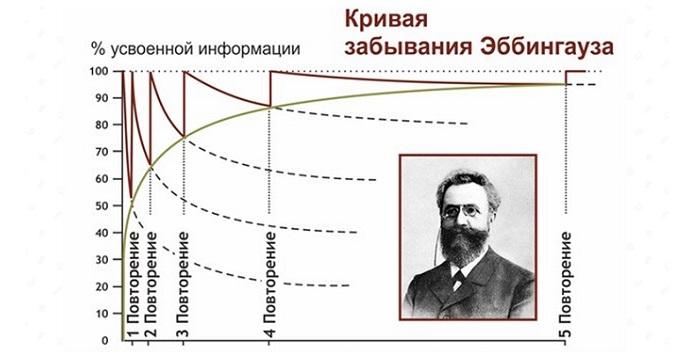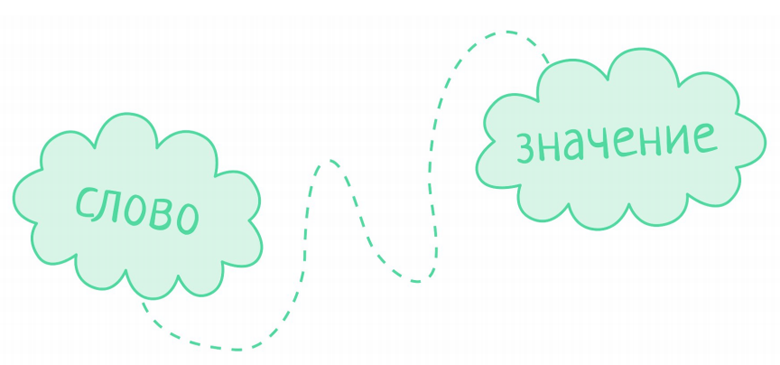How to learn 100 English words per day

Vocabulary solves a lot. You know the words - you know what it is about, even without knowing the subtleties of grammar. If you don’t know the word, you are talking like a man-eating Ellochka. Today we are talking about how to memorize a lot and for a long time.
Normal word learning has low efficiency. For example, over 11 years of school curriculum, students memorize an average of 1-1.5 thousand words. To speak as a native speaker, you need to know at least 8 thousand words, the Upper-Intermediate level assumes knowledge of 6 thousand words. In order to understand CNN news, which are created taking into account the interest of a foreign audience, you need to know at least 3,000 words.
')
With the help of traditional methods, it is easy to learn up to 10 words in one approach, but only a few can remember 30 or 50 new words in one day.
Everyone who teaches a foreign language faces the following problems:
- words are quickly forgotten if they are not repeated;
- it is very difficult to learn many words at a time;
- people just do not know how to learn words effectively;
- when the word falls into short-term memory, the person stops working with him.
Why is that?
German psychologist Herman Ebbingauz was engaged in research devoted to "pure" memory - memorization, which is not affected by the processes of thinking. For this, the scientist proposed a method of memorizing meaningless syllables consisting of two consonants and a vowel between them, not causing any semantic associations.
During the experiments, it was found that after the first unmistakable repetition of a series of such syllables, forgetting happens very quickly. Already within the first hour, up to 60% of all received information is forgotten, 10 hours after memorizing, 35% of the studied remains in memory. Further, the process of forgetting goes much slower and after six days about 20% of the total number of originally learned syllables remain in memory, the same amount remains in memory after a month.
After a series of experiments in 1885, Ebbingauz derived the forgetting curve (also called the Ebbingauz curve). On its basis, the following conclusion was made: for effective memorization, it is necessary to repeat the memorized material.

To memorize information for a long time, after studying it is necessary to repeat it at least five times:
- 20-30 minutes after the first study;
- after a couple of hours;
- the next day;
- in 1-2 weeks;
- 2-3 months after the fourth repetition.
With the help of traditional methods (and repetition is one of them) it will not be easy to achieve a big effect. Effective methods are little known, so it is very difficult to learn many words at once.
Other traditional methods
- Learn with a dictionary, in order
Boring and inefficient. Words start in the same way, but have different meanings, so they are difficult to remember. In addition, you do not know in which context the word is used.
If you want to use a dictionary, it is more convenient to make a list of words on a particular topic, for example, select the category “Clothing” or “Travel”. A community of related words is easier to remember.
- Learn by card-stickers
On the one side of the card we write the word in Russian, on the other - in English. You need to spend time on making cards, but you can carry them around and repeat the words when there is free time. If you do not want to mess around with paper, you can download a special application on your smartphone.
- learn words in context
For example, when watching TV shows or movies. Beginners should start with TV shows, you can watch them with subtitles. You should not separately learn an unfamiliar word. Record or copy from the subtitles at once the whole sentence. So you remember in what situations it can be used.
Association method or "Mnemotechnika"
The Mnemotechnics method is gaining popularity.
The basic principle of this technique is to memorize information using the construction of visual links between a word and its meaning.

Facts about mnemonics:
- Scientists have found that visual connections are best created in the human brain.
- The method appeared 2.5 thousand years ago. It was used by the ancient Greeks, including the famous thinker Socrates.
- Mnemotechnika gives quick results. Anyone, if desired, can go to the speed of memorization from 100 words per hour and above.
Why mnemonics?
- The visual shares that are most involved in the use of this technique in the human brain are the most powerful, as they contain the most neurons.
- Any word in a person’s head has a meaning in the form of a specific picture. With the help of building associations, neural connections arise, they can be compared to a wire connecting a word with a picture, for example, when we hear the word “dog”, we represent a dog.
- Associations - the shortest way to access any information. For example, you heard a familiar song, and remember the situation in which you heard it before.
- This technique in practice has shown really excellent results - after a few workouts, it’s possible to memorize 100-300 words per approach.
Algorithm
Step 1
Present a bright, concrete picture. Suppose you want to learn the word fist (fist), you need to vividly present a clenched fist.
Step 2
Find the association for a similar sound with the Russian word. Fist in English fist. You can, for example, imagine a pistachio clamped in a fist. The best remembered are ridiculous and ridiculous associations: the brighter the better. It is also worth creating your own associations, as they will be more clearly stored in memory.
Step 3
Combine the association with the picture. The picture representing the word and the picture-association must be visually connected. For example, remembering the word crown (crown), you can imagine a crane that lifts the crown. If the crane and the crown in your imagination will simply be near, there will be no effect, it is better to imagine that the crane lifts the crown by the edge or on the rope. It is better to imagine a huge crown, since large objects are better remembered. You can also add a certain sound or music playing on the background, which you would associate with the crown.
Step 4
Repeat the memorized word out loud 4-5 times in English, slightly raising his eyes upward, as if looking at his bridge of nose. Scientists have found that in this position of the eye will involve the greatest number of neurons. You should keep your eyes open, if you memorize with your eyes closed, then you will remember with your eyes closed.
Step 5
Repeat words - at least in an hour or two, in a day and in a month. Qualitatively created associations are stored in memory for a month. If you do everything according to the algorithm with repetition, you will remember the words for years.
Typical mistakes
- Try to learn everything at once
Many begin to study intensively, wanting to learn English for a week or a month and quickly quit. It is much more efficient to set aside a little time, for example, half an hour, but every day. So the brain will have time to process the information and there will not be too much interruption for the word to be forgotten. At the same time, the memory will be in good shape, and there will be no overloads.
- Immediately learn complex words that do not correspond to the level of knowledge of the language
If the word is difficult to pronounce, you should not learn it. Beginners need to learn the most used words, these are about 400 words. More than half of them are verbs. Start with easy and build up complexity.
- Do not repeat learned
Without repeating new words are forgotten.
- memorize without understanding the context
You will not be able to use new words if you do not know in which situations they are used.
- memorize the wrong pronunciation
You must first listen to the correct pronunciation, even if you know the rules of reading well. To listen to a good site wooordhunt.ru .
Tips for those who want to learn words effectively
- The more practice, the better.
Experience has shown that after 300 words learned errors disappear, associations appear in the imagination very quickly and the end of the word is remembered very well, even if the association is consonant only with its beginning.
- It is important to learn quickly, without delaying.
For example, choose a thematic list for yourself, set a timer and read all the words in one minute.
- Increase the load gradually .
- Move from simple to more complex words.
Choose the most simple, which is easiest to learn. Then set aside five minutes to learn them, and rest for five minutes. Then learn more complex words from this list.
- Combine words into groups by topic and parts of speech.
First, it is better to learn nouns, then adjectives, then verbs.
And the most important thing
- Share your progress with friends to maintain your motivation.
- Encourage your success to get used to the fact that learning is good.
- Develop memory in general, not only in English.
- Practice the words you learn in conversational clubs to finally fix the words in context.
By the way, we just have a great free section "Dictionary" on the site. In it we tried to take into account all the components of the successful memorization of words. You can choose from ready-made sets of words, as well as create your own. In addition, you will find many more useful things: from video clips and a blog to conversational clubs and classes with a teacher on Skype.
Bonuses for Habr's readers
Online Courses
We give you access for a year to the English course for self-study "Online course".
To access, simply follow the link .
Individually by Skype
Specialized course " English for IT-specialists "
Classes are held at any time convenient for you.
Promo code for 15% discount: 5habra15
Valid until June 1st. Enter it when paying or use the link .
Among our students there are already students from GeekBrains, ITVDN, Softengi, Netology. Join now! And we wish only successful interviews and career success.
Source: https://habr.com/ru/post/328112/
All Articles